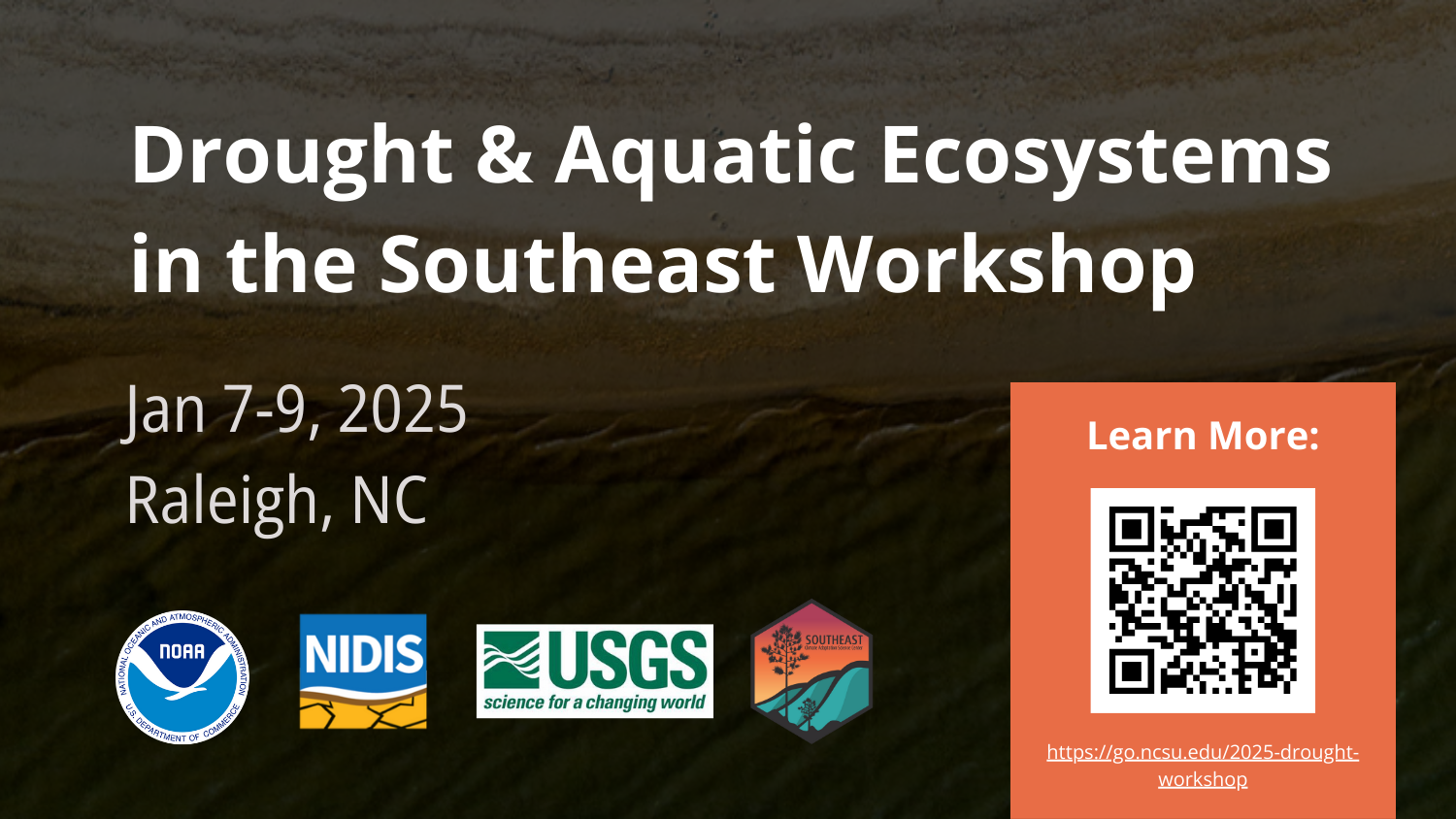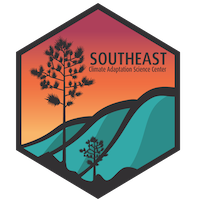2025 Workshop on Drought and Aquatic Ecosystems in the Southeast U.S.

A regional workshop on ‘Drought and Aquatic Ecosystems in the Southeast: Informing drought response and ecological resilience to future low-flow events’ will be held on January 7-9, 2025, in Raleigh, North Carolina.
Registration for the workshop will open in August on the workshop website. Sign up to be notified when registration opens. Further agenda details to come.
What: Given the broad interest and need to better understand and plan for ecological drought in the Southeast, the USGS Southeast Climate Adaptation Science Center (SE CASC) and NOAA’s National Integrated Drought Information System (NIDIS), in support of the Southeast Drought Early Warning System (DEWS), will convene a 3-day workshop addressing drought and low-flow in the Southeast.
- Theme 1 will focus on understanding drought/low-flow ecosystem impacts and water resource management in the context of the Southeast.
- Theme 2 will focus on ecological drought monitoring and response in the near-term.
- Theme 3 will focus on incorporating drought/low-flow in long-term resilience and adaptation planning.
This workshop will provide an opportunity to share available science, resources, and best practices; jointly identify key management priorities and research questions; and expand the region’s ability to respond and prepare for future droughts.
When: January 7-9, 2025
Where: Raleigh, North Carolina
Who: The intended audience for this workshop are federal, Tribal, regional, and state natural resource managers, water resource managers, drought planners, regional boundary organizations (water and climate), scientists, and data providers. The geographic scope will be Alabama, Arkansas, Georgia, Florida, Mississippi, North Carolina, South Carolina, Tennessee, and Virginia.
Why: The Southeast region has experienced several periods of exceptional drought in the 21st century and is a hot spot for frequent drought events that can rapidly intensify. Competing water demands stress supply even in this humid region. Historically, drought has been viewed in terms of its agricultural, hydrological, and socioeconomic impacts. How drought affects ecosystems—and the services they provide human communities—has only recently been acknowledged as an important area of research. The USGS Southeast Climate Adaptation Science Center held an ecological drought workshop in 2016 to better understand management challenges in a regional context. In the seven years since this regional discussion, there has been a significant amount of hydroclimatic change research, but a limited focus on ecosystem impacts, especially in the Southeast. Understanding the impacts of low-flow and drought on natural systems to inform future research needs, management practices, and adaptation planning is a critical need. The time is ripe to weave together and articulate what we have learned so far from the science community, identify if there are some commonalities across different parts of the region, and produce a scientific baseline—driven by management and planning needs—to inform future research investments.
If you have any questions about this workshop, please contact Meredith Muth (meredith.f.muth@noaa.gov) and Kasia Nikiel (cnikiel@usgs.gov).
Information About Conveners
Southeast Drought Early Warning System
The Southeast Drought Early Warning System (DEWS) is a collaborative federal, regional, state, and local interagency effort to improve drought early warning capacity and build long-term drought resilience throughout the region. Launched in 2020, this regional network includes Tennessee, Virginia, North Carolina, South Carolina, Georgia, Florida, and Alabama. This is one of eight regional DEWS networks across the nation coordinated by NIDIS. Read the 2022-2025 Southeast DEWS Strategic Action Plan.

Southeast Climate Adaptation Science Center
The Southeast Climate Adaptation Science Center (SE CASC) is part of a network of nine Climate Adaptation Science Centers managed by the U.S. Geological Survey National Climate Adaptation Science Center. Our mission is to deliver science to help fish, wildlife, water, land, and people adapt to a changing climate. The current SE CASC footprint covers Tennessee, North Carolina, South Carolina, Georgia, Florida, Alabama, Mississippi, Arkansas, Puerto Rico, and the U.S. Virgin Islands. The National and nine regional CASCs are federal-Tribal-university partnerships made up of a consortium of institutions, including university, Tribal, and non-profit institutions. Read a summary of 2016 Southeast Workshop and the National CASC synthesis document.

- Categories:
